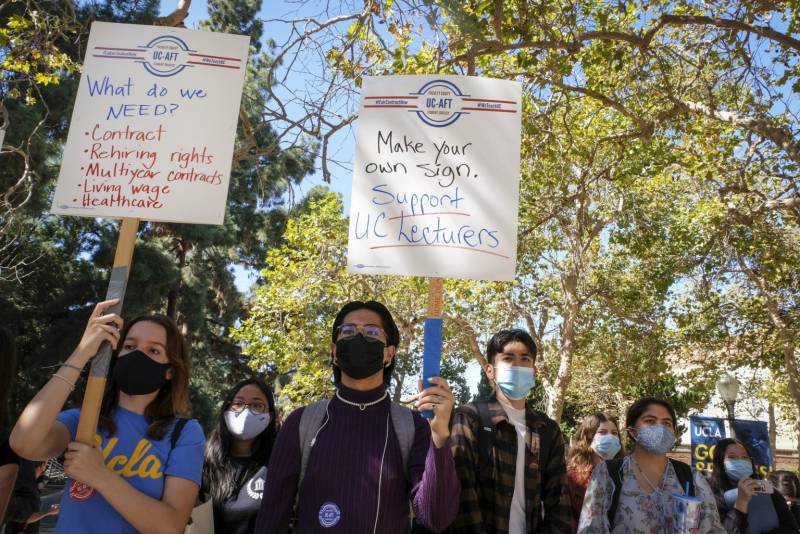McIver said that may look fair, but what happens if the department decides to keep the class anyway? The lecturer still won’t be able to have the class back, she added.
There’s less movement on matters of pay. The union wants bigger raises than what the UC is offering, which is about 4% in the first year of the five-year contract and 3% annually thereafter. Other lecturers would get additional bumps and extra merit pay. The lecturers say the UC can offer more across the board, citing the 5% increase in state support the recent state budget sent the UC’s way.
The UC argues it offers some of the best pay to lecturers among top research universities. “In October 2019, UC systemwide’s average salary on an annualized basis was $71,068 for pre-six lecturers and $92,693 for continuing lecturers,” wrote Ryan King, a UC spokesperson.
The UC offer on pay
But that number is misleading: More than half of lecturers are part-time, according to a CalMatters review of UC data the lecturer union shared, meaning most lecturers don’t get that annualized pay. And many lecturers work one term but not the next. A CalMatters analysis of wage data shows that lecturers on average make close to $33,000, while more permanent academic faculty make three to six times as much.
Another major issue is how much a lecturer is paid per class. Basically, lecturers get paid a percentage of an annual salary based on the “workload” of each class. The union is upset that the same classes can be counted as, for example, one-seventh of full-time work or one-ninth depending on the campus. They want consistency throughout the system.
For lecturers, those fractions matter: For one, the higher the percentage of full-time work, the greater the pay. Also, health benefits can kick in at around 44% or 50% of full-time work, depending on how many hours a lecturer works in the year. So every extra fraction of workload goes a long way to determining whether a lecturer has health insurance through the UC.
“The University of California should be a responsible employer and provide accessible, affordable, quality health benefits and a living wage for all of its employees so that no UC employee must rely on public assistance,” wrote Sen. Pan. His letter noted that some UC lecturers rely on Medi-Cal because they’re ineligible for UC health insurance.
Will lecturers strike?
McIver, the union president, doesn’t know whether lecturers will strike. She said they’d rather have a settled contract. “The things that we need to cross the finish line of this contract are not onerous for our employer,” McIver said. As far as the union is concerned, the ball is in UC’s court.
Friday’s bargaining meeting with the UC “is a positive step,” McIver said. But the union’s lecturers will decide whether they like the offer the UC is presenting, so it’s impossible to gauge how close to a resolution both sides are.
“We need our lecturers,” Silas said. “We appreciate and value our lecturers.”
No strike about the contract terms can happen until a state-led labor mediation process runs its course. Both sides are in mediation, but Friday’s meeting is independent of that state-led process.

